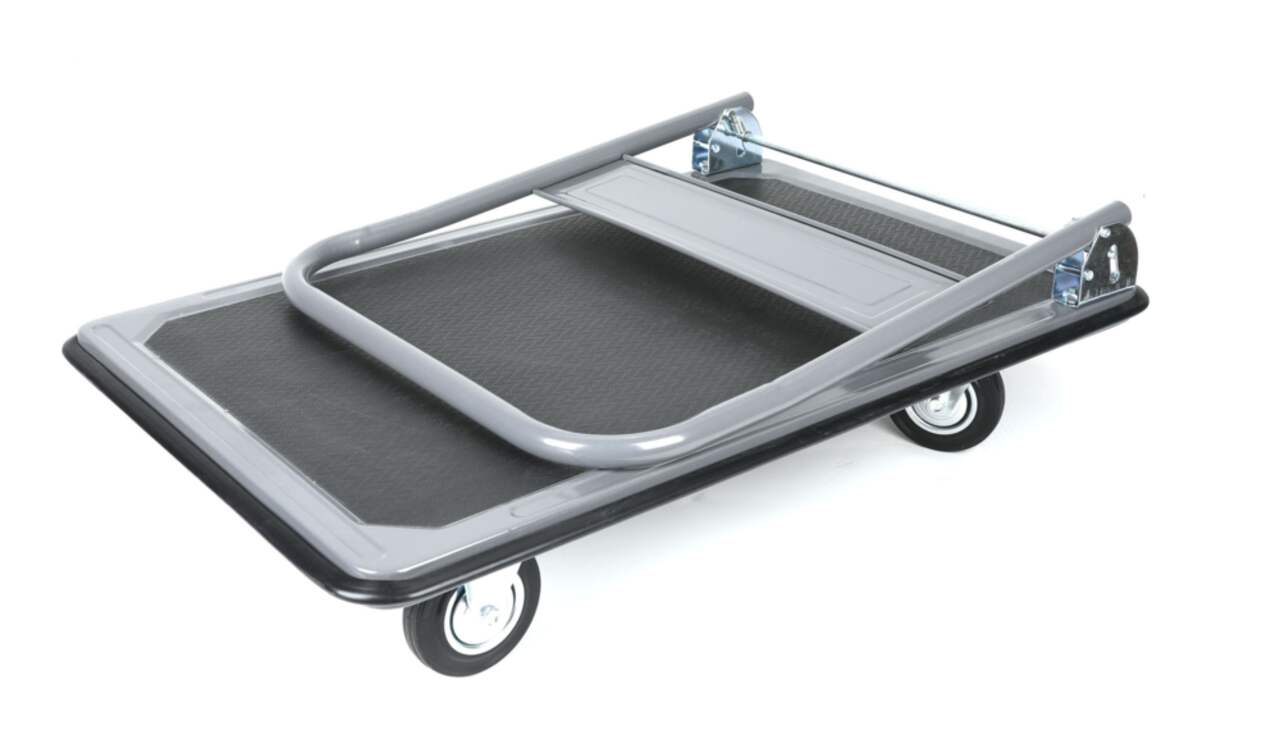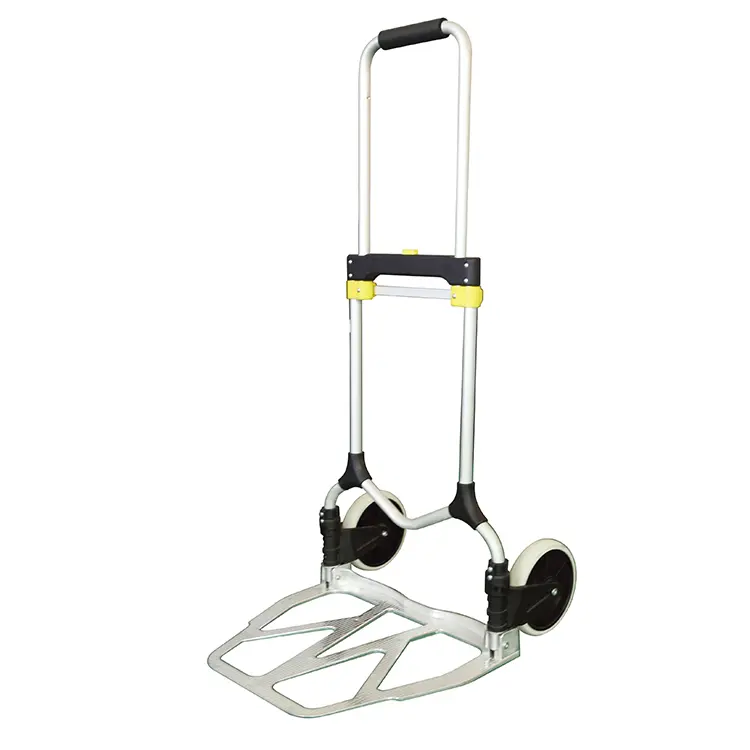Views: 220 Author: shunhehandtruck Publish Time: 2025-11-17 Origin: Site











Content Menu
● Understanding Platform Hand Trucks
>> What Are Platform Hand Trucks?
>> Importance of Choosing the Right Material
● Key Differences Between Aluminum and Steel Platform Hand Trucks
● Choosing the Right Hand Truck for Your Needs
>> 1. What is the primary advantage of aluminum platform hand trucks?
>> 2. Can steel hand trucks rust?
>> 3. Which type of hand truck is better for heavy loads?
>> 4. Are aluminum hand trucks suitable for outdoor use?
>> 5. How do I choose between aluminum and steel hand trucks?
When it comes to transporting goods, platform hand trucks are essential tools in various industries, from warehouses to retail environments. Two of the most common materials used in the construction of these trucks are aluminum and steel. Each material has its unique advantages and disadvantages, making it crucial for businesses to understand the differences to choose the right type for their needs. This article will explore the key differences between aluminum and steel platform hand trucks, including their weight, durability, load capacity, maneuverability, and cost.

Platform hand trucks, also known as flatbed carts or platform trolleys, are wheeled vehicles designed to transport heavy loads. They typically feature a flat surface for placing items and are equipped with wheels for easy movement. These trucks are widely used in various settings, including warehouses, factories, retail stores, and even homes.
The choice of material for a platform hand truck significantly impacts its performance, durability, and suitability for specific tasks. Understanding the differences between aluminum and steel can help businesses make informed decisions that enhance efficiency and safety in their operations.
One of the most significant differences between aluminum and steel platform hand trucks is their weight.
Aluminum hand trucks are known for their lightweight design. They can be up to 25-40% lighter than their steel counterparts. This reduced weight makes them easier to maneuver, especially in tight spaces or when navigating stairs. The lightweight nature of aluminum also helps reduce operator fatigue, allowing for longer periods of use without discomfort.
In contrast, steel hand trucks are considerably heavier. While this added weight contributes to their durability, it can make them more challenging to move, especially when loaded. The extra weight can also lead to increased physical strain on workers, particularly in environments where frequent lifting and maneuvering are required.
Durability is another critical factor when comparing aluminum and steel platform hand trucks.
Aluminum is a strong material that can withstand significant loads, but it is not as robust as steel. While aluminum hand trucks are suitable for most commercial applications, they may bend or dent under extreme weight or impact. However, aluminum is resistant to rust and corrosion, making it an excellent choice for environments where moisture is a concern.
Steel hand trucks are renowned for their strength and durability. They can handle heavier loads, often exceeding 1,000 pounds, making them ideal for industrial applications. However, steel is prone to rust if not properly coated or maintained. In environments where exposure to moisture is common, steel hand trucks may require regular maintenance to prevent corrosion.
The load capacity of a hand truck is a crucial consideration for businesses that need to transport heavy items.
Aluminum platform hand trucks typically have a lower load capacity compared to steel models. They are generally designed for lighter to medium loads, making them suitable for tasks such as moving boxes, equipment, or supplies in a retail or office setting. Most aluminum hand trucks can handle loads ranging from 300 to 600 pounds.
Steel hand trucks excel in load capacity, often supporting weights of 800 pounds or more. This makes them the preferred choice for heavy-duty applications, such as transporting machinery, large appliances, or bulk materials in warehouses and factories.
Maneuverability is essential for efficiency, especially in busy environments.
Due to their lightweight design, aluminum hand trucks are easier to maneuver. They can be lifted and turned with minimal effort, making them ideal for navigating crowded spaces or tight corners. This ease of movement can lead to increased productivity, as workers can transport goods more quickly and with less physical strain.
While steel hand trucks are durable, their heavier weight can hinder maneuverability. They may require more effort to push or pull, especially when loaded. In environments where quick movements are necessary, the added weight of steel can slow down operations and increase the risk of worker fatigue.
Cost is always a factor when making purchasing decisions.
Aluminum hand trucks tend to be more expensive than steel models due to the cost of the material and the manufacturing process. However, their lightweight nature and resistance to rust can lead to lower maintenance costs over time, making them a worthwhile investment for businesses that prioritize efficiency and ease of use.
Steel hand trucks are generally more affordable upfront, making them an attractive option for businesses on a budget. However, the potential for rust and the need for maintenance can add to long-term costs. For companies that require heavy-duty performance and can manage the maintenance, steel hand trucks may provide better value in the long run.
When deciding between aluminum and steel platform hand trucks, businesses should consider several factors:
1. Type of Loads: Assess the typical weight and type of items you will be transporting. For lighter loads, aluminum may be sufficient, while heavier items may necessitate steel.
2. Environment: Consider the working environment. If moisture is a concern, aluminum's rust resistance may be beneficial. In contrast, steel may be better suited for dry, industrial settings.
3. Frequency of Use: For frequent use, the lightweight nature of aluminum can reduce operator fatigue and increase productivity. Steel may be more appropriate for occasional heavy-duty tasks.
4. Budget: Evaluate your budget for initial purchase and long-term maintenance costs. While aluminum may have a higher upfront cost, its durability and low maintenance can offset this over time.
5. Maneuverability Needs: If your operations require frequent movement in tight spaces, the lightweight design of aluminum hand trucks can enhance efficiency.
In summary, both aluminum and steel platform hand trucks have their unique advantages and disadvantages. Aluminum hand trucks are lightweight, rust-resistant, and ideal for lighter loads, making them suitable for environments where ease of movement is essential. On the other hand, steel hand trucks offer superior strength and load capacity, making them the preferred choice for heavy-duty applications, albeit with a heavier design that can impact maneuverability.
Ultimately, the choice between aluminum and steel platform hand trucks should be based on the specific needs of your business, including the types of loads you handle, the working environment, and your budget. By understanding the differences between these two materials, you can make an informed decision that enhances efficiency and safety in your operations.

Aluminum platform hand trucks are significantly lighter than steel models, making them easier to maneuver and reducing operator fatigue.
Yes, steel hand trucks can rust if not properly coated or maintained, especially in moist environments.
Steel hand trucks are generally better for heavy loads, often supporting weights of 800 pounds or more, compared to aluminum hand trucks.
Yes, aluminum hand trucks are resistant to rust and corrosion, making them suitable for outdoor use, although they may not be as strong as steel for heavy-duty tasks.
Consider factors such as the weight of the loads you will transport, the working environment, frequency of use, budget, and maneuverability needs when choosing between aluminum and steel hand trucks.
Hot Tags: China, Global, OEM, private label, manufacturers, factory, suppliers, manufacturing company
How To Choose The Right Aluminum Platform Hand Truck for Your Business Needs?
What Is The Difference Between Aluminum Platform Hand Trucks And Steel Platform Trucks?
What Are The Key Features of Aluminum Platform Hand Trucks You Need To Know?
What Makes Aluminum Platform Hand Trucks Different From Other Material Handling Carts?
What Is An Aluminum Platform Hand Truck And Why Should You Choose One?
Best Aluminum Platform Hand Trucks with Corrosion-Resistant Frames for Long-Term Use
Top-Rated Aluminum Platform Hand Trucks for Industrial Use: Features And Benefits
Best Lightweight Aluminum Platform Hand Trucks for Warehouse Efficiency
Best Aluminum Platform Hand Trucks for Heavy-Duty Material Handling in 2025
How To Maintain Your Two Wheel Hand Trolley for Long-Lasting Performance?